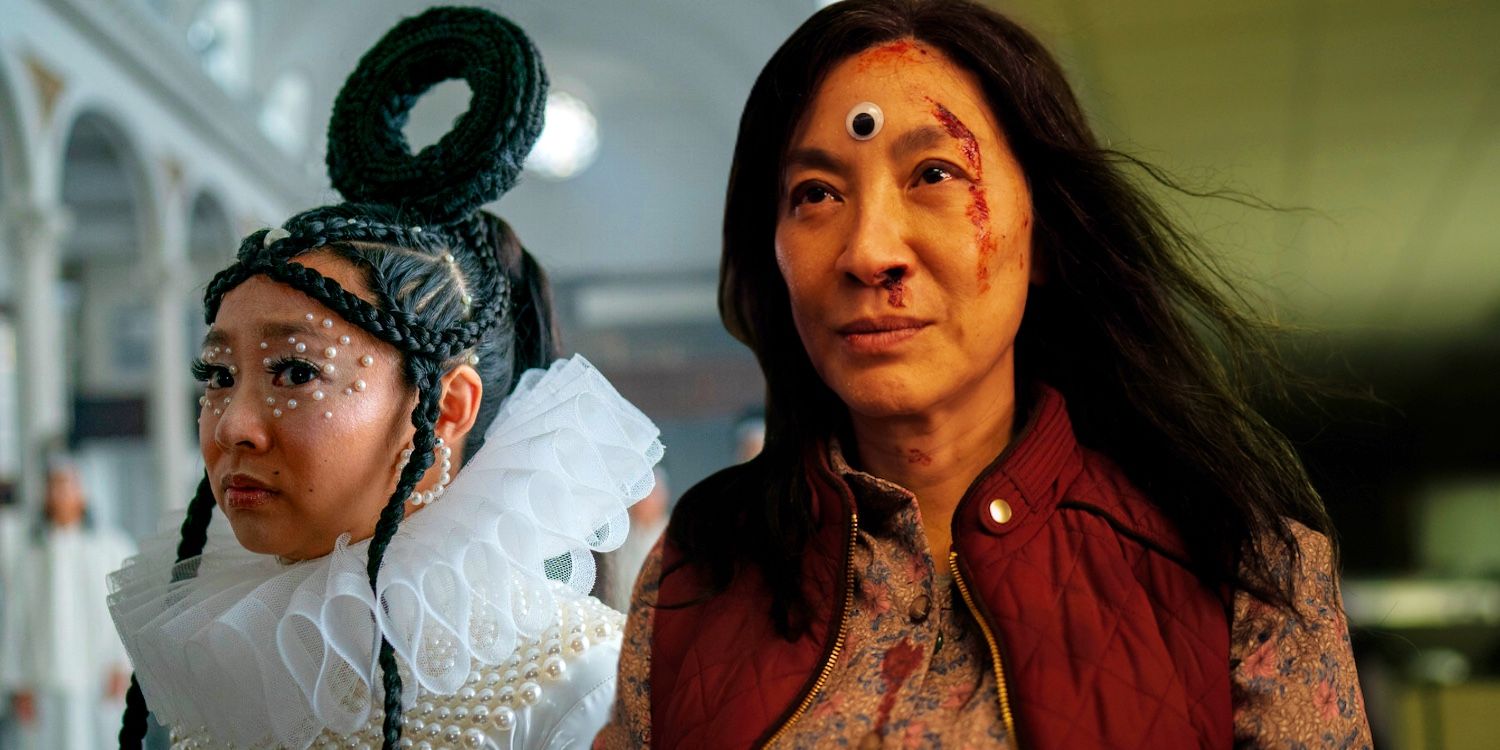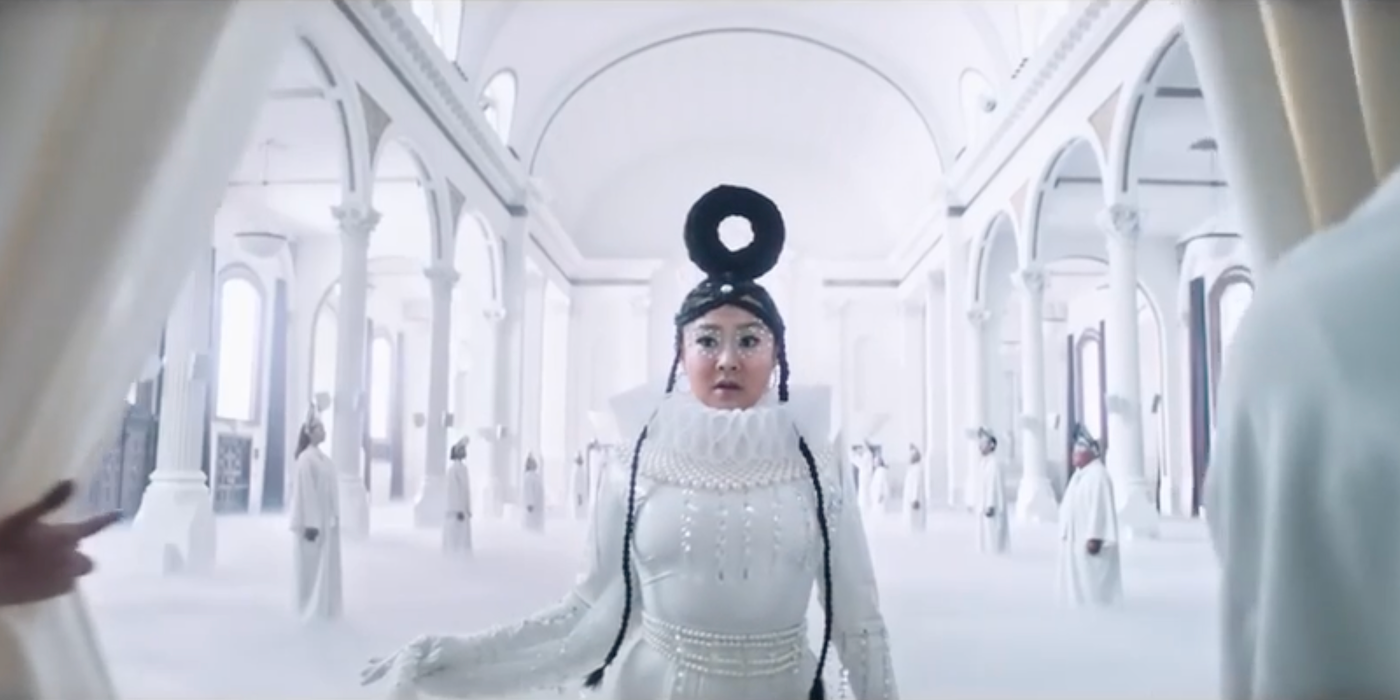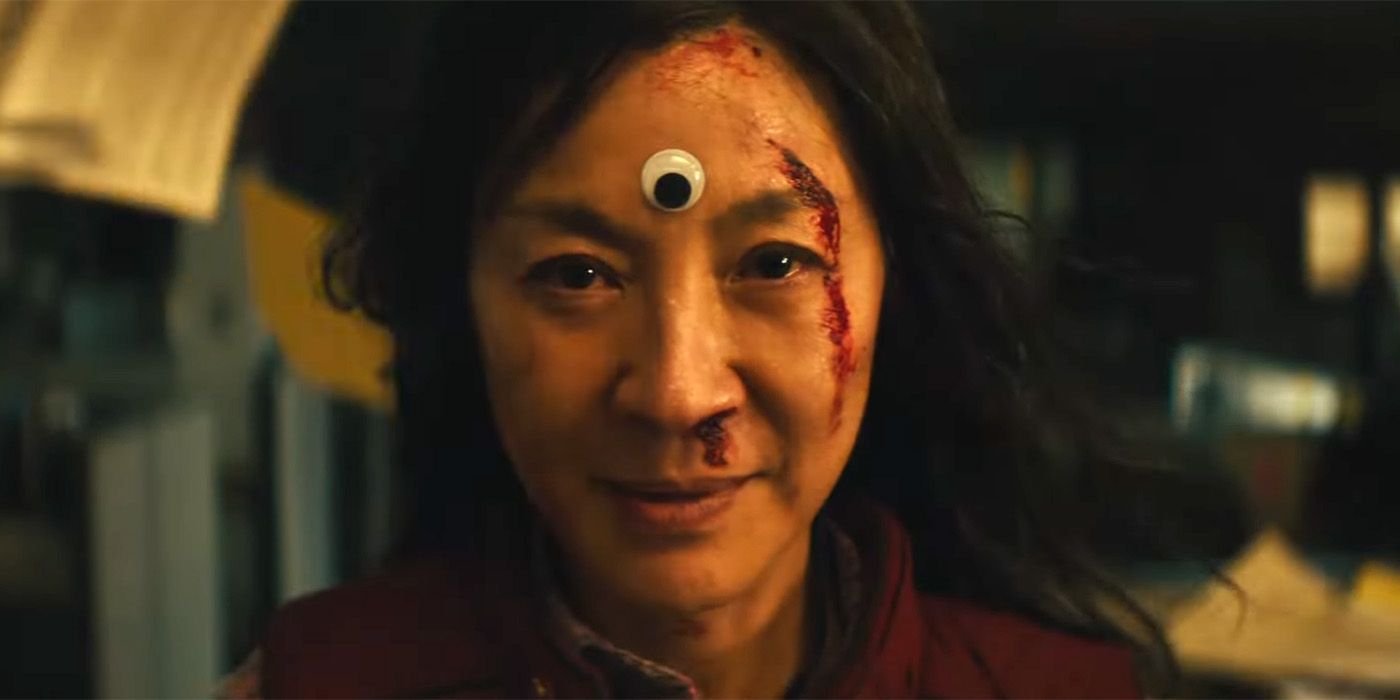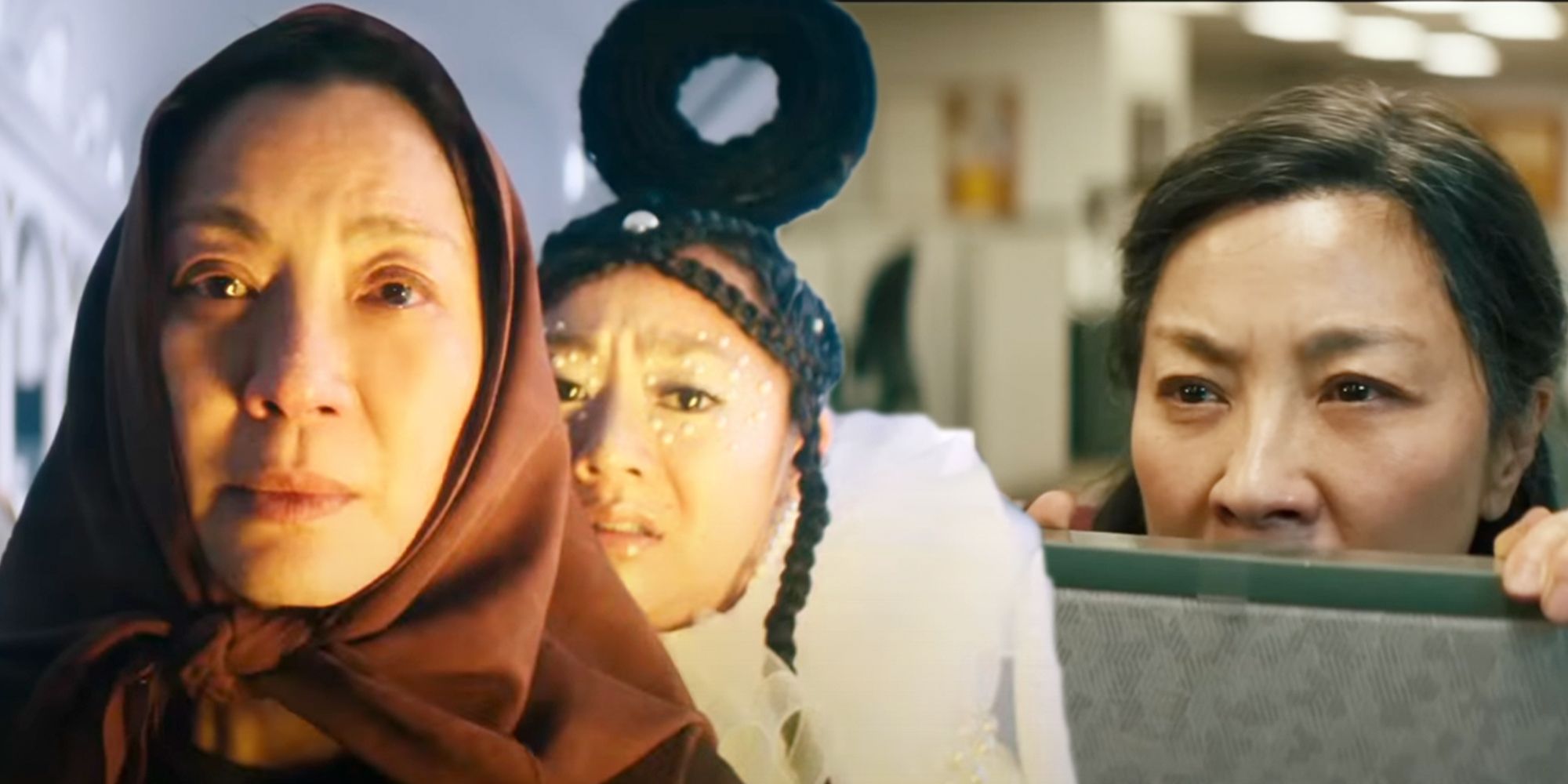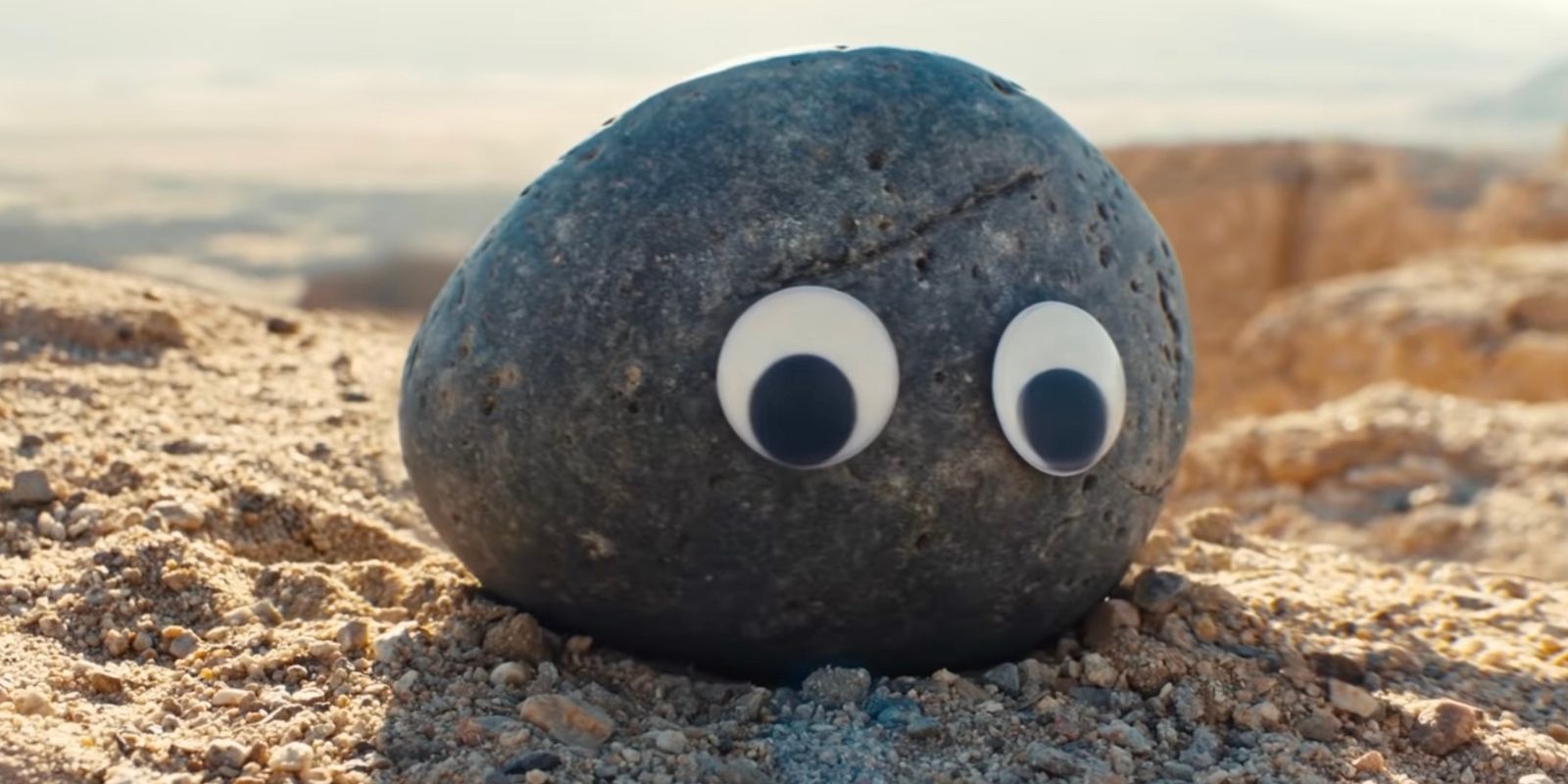Everything Everywhere All at Once's symbolism — especially the bagels and googly eyes — suits the movie's brand of absurdist comedy, but both objects have much deeper meanings than first appears. Directed by the Daniels, Everything Everywhere certainly lives up to its name with its multiverse premise and maximalist tone. In fact, apart from Michelle Yeoh and Ke Huy Quan winning Golden Globes and getting their first-ever Oscar nominations for their respective roles as Evelyn and Waymond Wang, the movie has been nominated for a total of 11 Academy Awards. Notably, this includes a 2023 Oscar nomination for Best Achievement in Costume Design for Everything Everywhere All At Once's Shirley Kurata, who led the team that created the now-iconic bagel outfit.
That dichotomy between absurdity and meaning is best illustrated by Everything Everywhere's two key symbols: googly eyes, and an everything bagel. The two symbols visually oppose one another, with the villain Jobu Tupaki's bagel being black with a white center, while the googly eyes are white with a black center. They're visual opposites, yet when considered side by side, the googly eyes and bagels resemble the Chinese philosophy of yin and yang, which promotes balance and how oppositional forces within nature — and a multiverse — complement one another. Here's what the Everything Everywhere All At Once symbolism means.
What Everything Everywhere All At Once's Bagels Represent
Beyond Everything Everywhere All at Once's bagels and googly eyes, circles are everywhere in the movie. When Evelyn first visits the IRS building, the inspector, Deidre, circles her paperwork in black ink, telling Evelyn that she's going to have to produce more accurate paperwork for the year. Nothing ever goes according to Evelyn's plan, yet time keeps moving relentlessly. Even in her struggling laundromat underneath her home, the circular windows of washing machines whir all day and all year long. In a less subtle exposition of Everything Everywhere All at Once's symbolism, Evelyn becomes aware of the circularity of her life — at a birthday get-together in the laundromat she runs, she gives a less-than-inspiring speech saying, "Another year, pretending we know what we're doing, but really we're just going around in circles."
Hence, circles become the object that represents Evelyn Wong's dissatisfaction with her extremely mundane life with her family. This dissatisfaction is what negatively impacts the philosophy of her daughter, Joy, as well as Jobu Tupaki, who is another, evil, version of Joy in the multiverse. Jobu Tupaki's beliefs are also influenced by her ability to freely verse jump and experience the entirety of the multiverse in Everything Everywhere All At Once.
After becoming aware of the meaninglessness of her existence, Jobu Tupaki creates the everything bagel as her tool to destroy the multiverse. In essence, the bagel becomes a symbol of Evelyn and Jobu's nihilistic worldview — it's got everything seasoning, everything in the multiverse, on every inch of it, and yet its core is empty, like a black hole. The destructive nature of the bagel, and the fact that its original purpose was to destroy its creator, Jobu Tupaki, demonstrates that the bagel also becomes symbolic of despair once one discovers the hollowness of their existence.
What Everything Everywhere All At Once's Googly Eyes Really Mean
The one way to withhold crushing existential dread is with googly eyes — a sentence that in itself demonstrates the playful absurdity of The Daniels' movie. In the hilarious Everything Everywhere All at Once, googly eyes are synonymous with Evelyn's husband, Waymond. To her annoyance, he puts them on everything he can find. Evelyn, who is dissatisfied with her life and husband, removes the googly eyes and rejects his trivial attempts to encourage humor and happiness. Despite her interference, he remains undeterred. As such, the googly eyes symbolize Waymond's philosophy that even if existence is meaningless, one can find joy within it. As he says in the movie, "The only thing I do know is how to be kind."
Since the googly eyes resist the bagels, the googly eyes can be seen as representing existentialism — that is, the human pursuit to create meaning for themselves. As Everything Everywhere progresses, Evelyn sees the value of Waymond and his beliefs. By the final clash between Michelle Yeoh's Evelyn and Stephanie Hsu's Jobu Tupaki, instead of taking the googly eyes off everything, Evelyn places a googly eye in the center of her own forehead. This references bindis in Hinduism, which are placed between the eyes since the belief is that this is the location of the sixth chakra, which represents concealed wisdom and enlightenment.
In Everything Everywhere All at Once, Evelyn's enlightenment is that she must create her own meaning, and use that newfound purpose to combat the nihilistic dread of Jubo Tupaki and her multiverse-destroying bagel. Yet, this enlightenment cannot be achieved if Evelyn does not accept the nihilistic philosophy that the everything bagel represents. Thus, one cannot exist without the other, and the co-existence of the bagels and the googly eyes is demonstrative of the ideals of balance behind the philosophy of yin and yang.
The Everything Everywhere All At Once Symbolism Reveals Its Core Message
While it can be easy to get lost in Everything Everywhere All At Once's symbolism, Easter eggs, and references, what's important to remember is its core message: the value of finding meaning in the vast, infinite meaninglessness of the multiverse. Combined with the movie's extreme absurdism and Evelyn and Joy's relationship, Everything Everywhere All At Once's bagels, googly eyes, and other pertinent themes/metaphors point to this one approach to life. The symbolism may seem silly, but Everything Everywhere All At Once actually postulates that the search for meaning itself is the meaning of life — the only real remedy to the nihilistic absurdity of the random universe.
Everything Everywhere All At Once's Awards Validate Its Symbolism
Everything Everywhere All At Once bagging two Golden Globes and 11 Oscar nominations shows that its deep symbolism hasn't been lost on the critics. Indeed, these awards speak volumes about critical and audience reception in an era that's commercially dominated by the superhero genre. Everything Everywhere, compared to most MCU movies, is nowhere near as financially successful, but uses the multiverse as a much more compelling symbol/storytelling tool. There's also something to be said about how this unusual movie from independent studio A24 secured first-time Oscar nominations both for veterans like the Daniels, Michelle Yeoh, Ke Huy Quan, Jamie Lee Curtis, and Stephanie Hsu, but also for unsung crew members like lead costume designer Shirley Kurata. Hopefully, neither the Academy nor the cast and crew of Everything Everywhere All At Once won't waste this opportunity to finally put googly eyes on Oscar awards.

